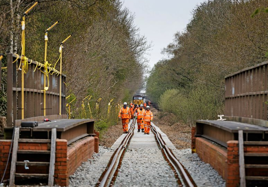Will Project Speed survive?
“I think it will survive,” says Cara Murphy. “But I don’t think it will be called Project Speed. It’s just a framework to get people to think about doing things differently.
“It costs far too much money to operate the railway the way we do currently. We can no longer afford - or justify politically - to continually go several million pounds over budget and deliver two or three years late.
“But I hope the focus on ‘Minimum Viable Product’ will come through. If you end up with a focus more on getting things done, and less on the tick-box governance, with the finger-pointing of accountability and blame, then you’ll more or less get Speed.”
Clarke agrees: “It has to survive. It needs to become the everyday process, and nothing special. Project Speed is about addressing time-wasting inefficiency that we have allowed to grow up, that should never have been tolerated. If you only have a finite amount of money to spend, and it’s a smaller amount than before, then you have to apply this approach.”
“We won’t hold onto the branding forever,” says Christian Irwin.
“But this is what we are calling our transformation programme. It is about reducing the complexity of what we do. We are not going to reduce the time or the cost by 50% on every scheme. Delivering at pace is really important, but not if delivering at pace means delivering at higher cost. We still have inefficiencies in the way we work, but we are definitely going in the right direction.
“Let’s say that in two years’ time, we are not talking about Project Speed any more, but let’s say we are delivering phenomenal efficiency. We are already hitting a 20% efficiency target across our investment portfolio.”
Murphy concludes: “The railway was already losing credibility. That’s why Project Speed was needed. It is needed even more now. But do politicians care at the moment? Probably not. They have bigger things on their mind than rail efficiency.
“We are lucky to have politicians who supported the railway, even if they haven’t always considered them to be essential infrastructure. I don’t think the next generation is even going to consider trains as socially essential, and they won’t want to spend money on railways. That’s what Project Speed is really up against.” ■














